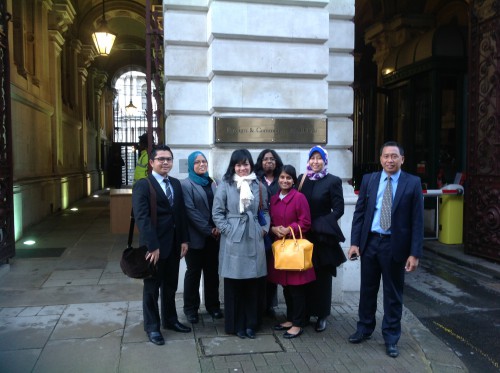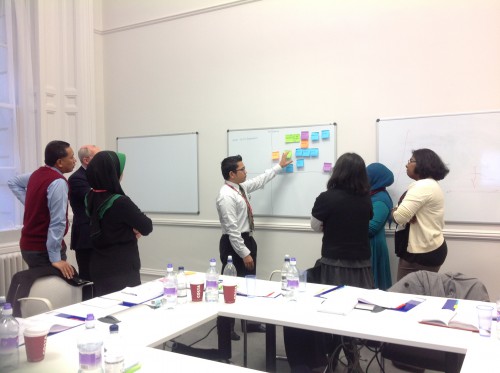27th March 2014 Kuala Lumpur, Malaysia
Civil Servants Visit: Familiarisation, Foreign Policy and Fish and Chips!
Last month, in partnership with the Razak School of Government (RSOG), we sent five of Malaysia’s ‘rising talents’ within its civil service to London for a week-long familiarisation trip. The delegates came from a range of Malaysian government departments: the Ministry of Foreign Affairs (MFA), the Attorney General’s Chambers, the Ministry of Women, Family and Community Development, the Public Service Department and the Ministry of International Trade and Industry (MITI).
The visit offered the participants a unique insight into the rigorous UK government policy making process and an opportunity to engage with UK officials from across the spectrum of government. So how did they get on?
Over to Hazeelia Muhammad, Alwi Mohamad, Rina Hanis Rodzli, Angelina Gurunathan and Fazidah Fadzil to tell us all about it:
We were all nominated by our respective Ministries for this programme and hoped that after interview we’d be lucky enough to be selected as participants. We were told that this would be a pioneering programme for young officers (the first of its kind!) and we were really keen to see what the programme could offer. The UK’s civil service sounded like a very interesting place to see first-hand what Malaysia has inherited or modified and what else we could learn.
Our visit showed us that prioritising our policies and being transparent about our actions is very important, especially now, when the public has higher expectations of government performance. The UK actively engages with the public via social media and close engagement with the Parliamentary Relations and Foreign Affairs Committee, among others. Civil servants have to respond to each and every request made by the public, which is a big workload!
During the programme we had the opportunity to share views with other officials and participants on any issues, through the questions we asked during our meetings and discussions. We were also given the chance to understand how the UK’s history, culture and social system influence their present foreign policy and legal system.
Being in the UK, we also saw some interesting cultural differences. While it is easy to point out the obvious ones such as food and music, there are also differences in the way we think and react; how we speak and how we say things and what our priorities are. You don’t need to go to London to learn this, but you certainly need to be there to experience it! During our interactions throughout the programme we noticed how these little differences have the potential to make a huge impact. We also learnt that you can find faces from all corners of the world in London. This is something that as Malaysians we can relate to.
One of the highlights of the trip was Prime Minister’s Questions (PMQs) – we really appreciated the fact that we had front row seats in the public gallery for this! The International Policy Skills training day was another highlight, as we learnt so much during the session about the UK’s foreign policy making process. Being in the FCO building, which had magnificent architecture and paintings and having a tour of Parliament and learning about its history was also amazing.
We enjoyed some of the casual and frank conversations we had, not only with officials, but with everyone we came across. People’s willingness to be candid during our meetings gave us a better insight into how the civil service in the UK works. Ultimately, the visit enabled us to learn and exchange information, culture and experiences and we learnt to celebrate the similarities and respect the differences between us.
Most of all, we were able to network and establish friendships during that one week, despite the short time we had in the UK and the fact that we come from different Ministries and backgrounds. All of this would not have been possible without the assistance of the ever energetic and bubbly Sasha who was really helpful in making sure that everything went smoothly according to the schedules and of course Mr. Johari from RSOG who always surprised us with his analytical and well thought opinions.
Although we know this is not a blog about food, we also enjoyed the daily food excursions, especially for our dinner. We loved all the places Sasha brought us to and the choices were eclectic and offered new experiences. Of course, you can’t have a visit to London without trying traditional English fish and chips or scones!
Back in Malaysia, we’ll definitely be putting the tips and tools learnt during our policy making training into practice in our day-to-day work. Our experience in the UK showed us that while we don’t need to be guided entirely by the views and opinions of others, it is necessary for us to get our feelers out to know what others think of us and how they view us.
The civil service has to keep up with the times and for this we need to be vulnerable. The UK civil service was willing to be a little vulnerable by allowing us to visit and ask questions. Similarly the Malaysian civil service also opened up further by participating in this programme to exchange views and ideas on key issues. To a certain extent this resulted in the debunking of some misconstrued perceptions and eventually promoted further understanding of both sides.


